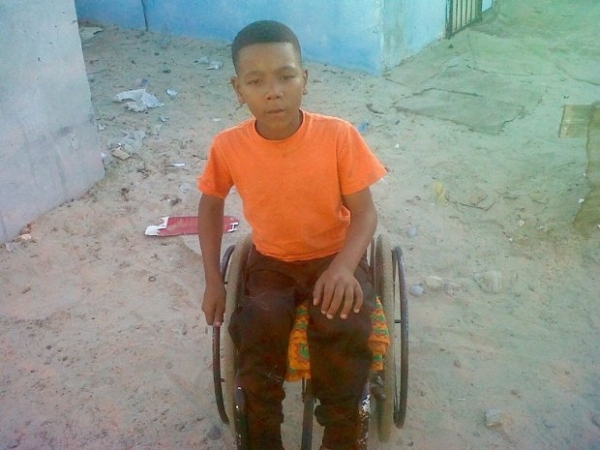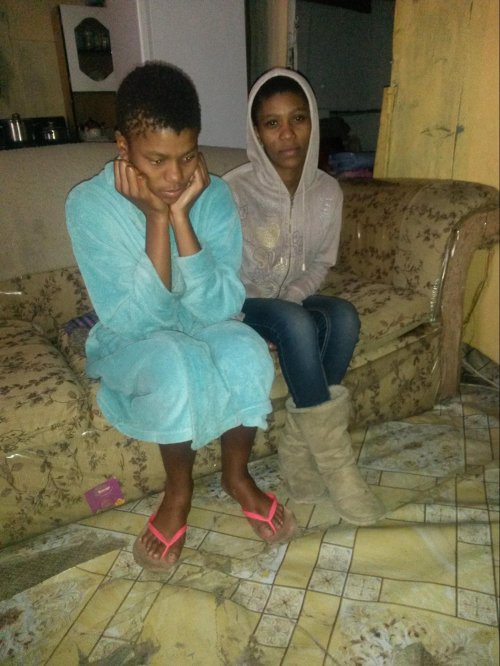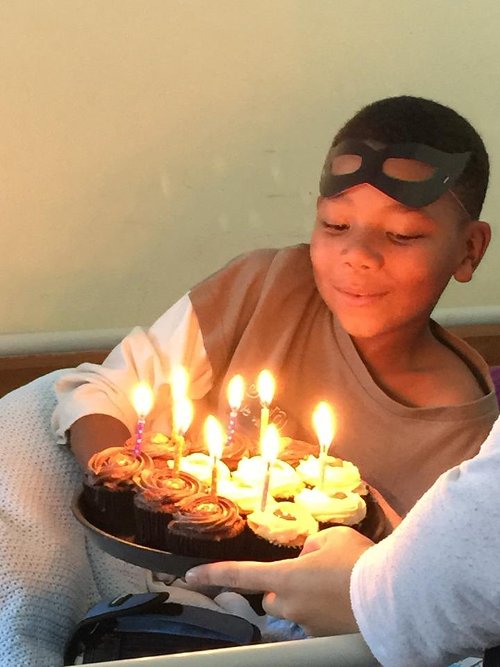How brave nine-year-old narrowly missed falling through the welfare system’s cracks

Luxolo “Nana” Ntsantsa was left paralysed from the waist down after a gunman killed his mother and left him for dead in their small shack in Site C, Khayelitsha nearly a year ago.
Following interventions spearheaded by the team at the Iris House Children’s Hospice, there is hope that nine-year-old Nana could regain mobility and one day walk again.
For the past few months, Nana’s sisters Amy and Thandile Ntsantsa aged 18 and 16 respectively, have been caring for him. Nana’s father (his sisters’ stepfather) left them soon after their mother’s murder, leaving them to care for their four-year-old sister and paralysed brother.
“It was school holidays in July and Nana was at home with my mother and sister Sino. He said he tried to defend her(mother), but he was shot in the leg and spine. Sino wasn’t harmed, but when we came home, she could tell us how my mother was bleeding,” said Amy Ntsantsa.
Ntsantsa said they were forced to send four-year-old Sino to her aunt in the Eastern Cape as they often went without food and didn’t have money to pay her creche fees.
Ntsantsa, who is a matriculant at Manyano High School in Khayelitsha, said her daily regimen consisted of caring for Nana and worrying about his safety when she was gone during the day.
“Everyday I woke up early, washed myself, I washed him and made him something to eat for later during the day and then I left for school. I used to stress at school. When I came home, I first had to change his (linen) nappy. His one foot was also swollen. We didn’t know what to do,” she said.
“It was so traumatic and painful for us when my mom passed away. She did everything for us. After she died, we didn’t have money to buy food or pay for anything. My school used to give us 10kg of rice, mealie pap and samp to eat,” she said.
Thandile became tearful while recounting the incident and the siblings’ hardship after their mother’s death.

Nana’s sisters, Thandile and Amy Ntsantsa at their home in site C, Khayelitsha. Photo by Barbara Maregele
On 14 May this year, one of Iris House’s care team managers, Zintle, found Nana trying to wheel himself across an unpaved road in Khayelitsha.
“After speaking to him, our care team manager realised how tragic his situation was. He lives in a child-headed household. His teenage sisters go to school during the day, leaving him to care for himself,” said Iris House Children’s Hospice chairperson Sue van der Linde.
According to a 2014/15 report by the Western Cape Department of Social Development (DSD), there are currently 119 children in 39 child-headed households recorded in the province.
This number has increased from 66 children in 24 child-headed households in the previous year. However, Department spokesperson Esther Lewis has attributed the increase to a “better understanding of child-headed households” and improved monitoring.
“The Department provides these families with individual counselling, nutritional support, material aid like uniforms, homework support, as well as referral to our funded NGOs that provide a more comprehensive package like post school support,” she said.
Van der Linde said they were touched by Nana’s story and immediately decided to help him and his sisters.
“With their permission we brought him into the hospice and examined him. We discovered that he has no feeling from his waist down, so he has no control of his bladder and bowel. Someone along the line gave him a catheter which he had been changing himself too,” she said.
As a result of Nana of being confined to a wheelchair all day and poor hygiene, he developed four pressure sores which were infected.
“We called everyone we dealt with at DSD and the health department for help. He was then taken to Karl Bremner Hospital and admitted on 20 May. Since then, they have performed two debridement procedures on his wounds. We put a plea out to the public for assistance and we have received over R18,000 to date among other items,” she said.
Van der Linde said they were hopeful that Nana would make a full recovery with the proper treatment and care.
“The doctors who have examined Nana believe that he could have full mobility with the right therapy. So we want to get him the best treatment possible. He had the first skin graft taken from his thigh which was done on Friday and is recovering well. We are hoping his rehabilitation will begin in July,” she said.
“This intervention is not just for Nana, there are also his sisters to worry about. We’ve opened a separate account and put it into a little saving for the family because this is a long term intervention,” she said.
Nana’s sister Amy added: “We went to see Nana in hospital on his birthday. I’m so happy that there are people who saw what we are going through and want to help. Since they have been helping us I’m coping at school now. I really want to do nursing next year,” she said.
Thandi said: “I don’t know what to say because it’s like Iris House feels our pain and we are grateful for their help.”
Van der Linde said that Nana was a sad example of how children often fell through the cracks of government systems.
“We as Iris House couldn’t turn our backs. He is just an example of a child who has slipped through the cracks of the system. Nobody caught this case because it should never have got as bad as it did. Nana could be bitter; he is everything but that. He just wants to live his life. He is such a brave little man,” she said.
Lewis said the Department of Social Development had been alerted to Nana’s plight three weeks ago.
“An official from Social Welfare worked with Iris House to facilitate the process of (Nana’s) admission to Karl Bremner Hospital for immediate, emergency intervention,” she said.
“He will be transferred to the Department’s rehabilitation facility where he will be provided with services to improve his independence and function. The long term plan is to ensure that he is safe; optimally cared for, and integrated back into school,” she said.
Western Cape Department of Education spokesman Paddy Attwell said after an assessment, Nana could be placed at a special needs school in Gugulethu.
“A special education support team has since conducted an assessment on Nana. He has been referred for further assessment at Tembalethu, a special school for physically disabled learners. The Department will seek to place (Nana) appropriately,” he said.

Nana celebrating his ninth birthday in hospital on 27 May. Photo supplied by Iris House.
Attwell said the Department was in the process of establishing “full service schools” in line with national policy surrounding inclusive education.
“These are ordinary schools that have facilities and training to support learners with special needs, in addition to our special schools,” he said.

This article is licensed under a Creative Commons Attribution-NoDerivatives 4.0 International License.


